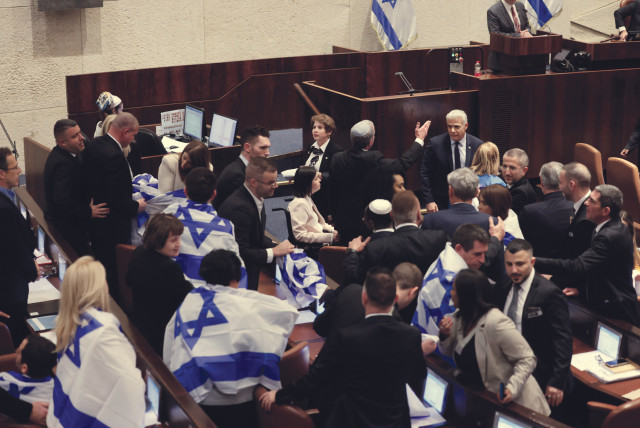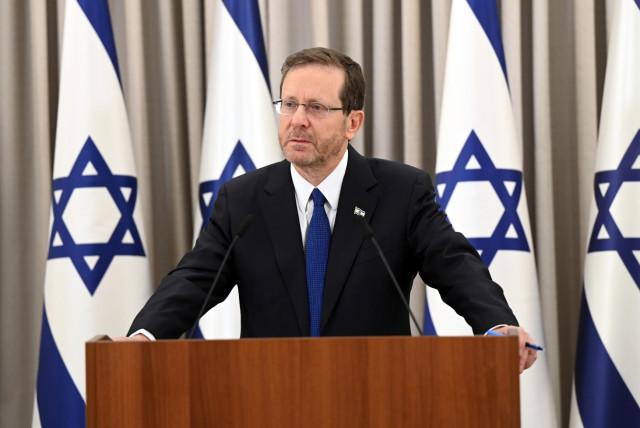Which direction is the judicial reform wind blowing in?

POLITICAL AFFAIRS: the wind in Israeli politics can change in the blink of an eye, and, with so many variables and unpredictable events lying ahead.
On March 27, Prime Minister Benjamin Netanyahu announced that the government was temporarily freezing its proposed judicial reforms, in order to engage in negotiations with the opposition at the President’s Residence.
Initial meetings began the next day. On April 1, the Knesset headed to its month-long spring recess. When it returned on April 30, the coalition focused solely on passing the 2023-2024 budget by the May 29 deadline – which passed into law last Wednesday.
This past week was the first in two months that the judicial reforms returned to the spotlight. The reforms rocked the country in January, February and March, then faded to the background in April and May. The next Knesset recess – and therefore, automatic legislation freeze – begins on August 1 and lasts until October 15, making July 31 a natural deadline in the ongoing judicial reform saga.
What, then, do June and July have in store?
The first date to focus on is June 14, when the Knesset will hold a secret ballot vote for its two representatives on the nine-member Judicial Selection Committee, the committee responsible for appointing all judges, including for the High Court of Justice.
The coalition traditionally allows one of the two Knesset representatives to come from the opposition. However, some coalition members threatened in recent weeks to fill both spots with MKs from the coalition. Opposition leaders MK Yair Lapid (Yesh Atid) and MK Benny Gantz (National Unity) threatened that if the coalition does so – they will quit the talks at the President’s Residence.
Why?
The arguably sharpest disagreement between the coalition and opposition over the judicial reform is the makeup of the committee, which includes three High Court justices, two ministers, two Knesset members, and two members of the Israel Bar Association.
Justice Minister Yariv Levin and other proponents of the reforms argue that the Bar members have an interest in siding with the judges before whom they appear in court. This gives the judges a de facto majority in the committee and the ability to choose whomever they see fit. Levin proposed that the coalition, not the judges, should have a majority in the committee, so that the elected representatives of the people become the ones to appoint the nation’s judges.
The opposition, however, argued that giving any coalition complete power over judicial appointments will turn these appointments into part of the political give-and-take, and thus create a system where judges are chosen due to their political affiliations and not their skill or expertise.
The opposition believes that a move by Levin to break with tradition and award the coalition both of the Knesset’s seats in the committee would indicates that the justice minister still wishes to increase the coalition’s, and hence the government’s, influence on the court, which for the opposition is unacceptable. Gantz and Lapid therefore threatened to leave the talks if this occurs.
However, even if an opposition member joins the committee on paper, Levin may choose not to convene the committee at all – and delay any judicial appointments, with the hope that the committee’s makeup could still be changed. According to Israel Hayom, Yesh Atid threatened that even if an opposition MK is chosen for the committee, if Levin does not convene it within a reasonable amount of time, Yesh Atid will still quit the talks.
With the June 14 vote in mind, there are four distinct scenarios that could play out in the next two months.
Scenario 1: The reform dies
According to this scenario, Netanyahu announces in the coming weeks that the reform is officially dead, citing a consensus among economists that the ongoing state of uncertainty surrounding the reforms is already creating economic damage.
Levin, Finance Minister Bezalel Smotrich and other ministers who support the reform paid lip service during the past week to promises that the “reform is not dead” and that the coalition would advance it if agreements were not made. But noticeably absent from these proclamations were threats that if the reform is announced dead, they will resign as ministers or even quit the government.
Without admitting to it openly, some of the staunchest supporters of the reforms have backed away slightly and realized some of the consequences it could have on society and the economy. Even Levin himself admitted, in an interview last month, that the initial version of the reforms, which he announced at the beginning of January, would have led to a “concentration of power in the hands of one branch of government.”
Still, an official announcement that the “reform is dead” is highly unlikely. Why?
According to a senior member of the Likud, who preferred to remain anonymous, Netanyahu cannot afford to completely drop the reform, since there are still large parts of the Likud’s voter base that support it. At the very least, Netanyahu must keep the talks at the President’s Residence alive, in order to serve as an excuse for no progress on the reforms. If the talks break up in the coming weeks, Netanyahu will need to pass some form of the reform, even if it is minor, by the end of July, in order to placate the Likud’s hawkish wing.
“Netanyahu seems pretty confused about what to do,” the senior Likud member said. “On one hand, he does not want at the moment to heat up the atmosphere and wants to receive a meeting at the White House, but on the other hand he is concerned about pressures he will face in the Likud and the coalition. He is debating what to do, and therefore is keeping all options open at this stage,” he added.
This was evident on Monday, when reports emerged from within a closed Likud Party meeting that Netanyahu had said that “the reform is not dead.” The Likud’s representative put out a clarification statement: What the prime minister said was, “The reform is not dead, but we are making every effort at the talks to reach broad agreements.” The first half of this sentence was aimed at the Likud’s hardliners; the second half, at the opposition and the White House.
Scenario 2: A happy ending
In this scenario, an opposition member is chosen for the Judicial Selection Committee. Levin convenes the committee by the end of June or early July. In the meantime, the President’s Residence publishes an “agreement in principle” document on some of the disputed issues. Likud MK Keti Shitrit revealed on Wednesday that such a document was being prepared, and said during a Channel 13 interview that this document could be “historic” and lead to an end to the judicial reform crisis.
The talks continue throughout the summer recess in order to fine-tune pieces of legislation that both sides agree on. Then, during the Knesset winter session, the coalition and opposition jointly begin to pass these bills, while the parts that are still in contention are dropped.
This rosy scenario is also highly unlikely.
Why? Because, while a sense of goodwill and moderateness is communicated by the members of the negotiating teams participating in the talks, there are many politicians – including Levin, Smotrich, Communications Minister Shlomo Karhi, Culture and Sport Minister Miki Zohar, Minister in the Justice Ministry David Amsalem and Knesset Constitution, Law and Justice Committee chairman Simcha Rothman – who have vowed to pass some parts of the reform with or without agreements. On the other side, there are many others – including Yisrael Beytenu leader MK Avigdor Liberman, Labor Party chairwoman MK Merav Michaeli, and many of the leaders of the protest groups against the judicial reforms – who do not trust the coalition, and are unlikely to believe that the coalition actually intends to respect any agreements that are reached.
These voices are being heard within the negotiating room and are raising the temperature, according to a representative of one of the members of National Unity’s negotiating team.
Each side needs to be able to present some sort of achievement by the end of July, and a mere “agreement in principle” is unlikely to suffice.
Scenario 3: All hell breaks loose
In this scenario, the coalition on June 14 appoints two coalition MKs to the Judicial Selection Committee, and the talks blow up. Pressure then builds on Netanyahu and the coalition to pass at least some of the judicial reform legislation by the end of July.
The most obvious candidate is the proposal for a Judicial Selection Committee revamp, since this bill advanced the furthest out of the handful of bills connected to the reforms, and only needs to pass second and third readings in the Knesset plenum to become law. This could happen within one plenum sitting, and, even with a filibuster attempt, the bill could pass within 48 hours of announcing that it is on the plenum’s agenda.
What happens then?
Protests against the government likely return at full force, and Israel spirals back to where it stood prior to March 27 – unrest, instability, strikes and shutdowns, perhaps even violence. The economy suffers, investments and perhaps credit ratings drop, and Israel suffers diplomatically as well.
This scenario, while more likely than the previous two, is still a long shot.
Netanyahu is unlikely to enable the Judicial Selection Committee revamp bill to pass, and his partners have shown that they are unlikely to topple the government over this. Even the hardliners in the government and coalition realize the potential damage of this bill passing, and are more likely to choose a different track – Scenario 4, which, as things stand now, seems to be the most likely.
Scenario 4: Uneasy truce
In this scenario, the talks at the President’s Residence break up either due to two coalition members being chosen for the Judicial Selection Committee, or, even if an opposition MK is appointed, due to Levin refusing to convene the committee.
Instead of going forward with the controversial revamp of the committee’s makeup, the coalition attempts to pass far less controversial laws in order to relieve some of the pressure – such as one that enables ministers to have their own legal representation if their policies are challenged in the High Court, or a law defining the limits of the judicial use of the “reasonableness clause.”
While these will still irk the opposition and lead to an increase in protests, they do not create as much internal strife as the Judicial Selection Committee bill. However, the summer recess will then pass with increased levels of uncertainty – what will stop the government from continuing the judicial reform legislation during the Knesset’s winter session, with the talks no longer going on?
This uncertainty is likely to negatively affect the economy, and, while major strife would be averted, a high level of tension would continue to bubble just beneath the surface.
This, essentially, would be kicking the can down the road to the Knesset winter session, when pro-reform politicians will resume their push for additional parts of the reform to pass, and anti-reform politicians and activists will continue to demonstrate, delay and put up as much of a fight as possible.
At this time, the wind seems to be blowing strongest in this direction.
But the wind in Israeli politics can change in the blink of an eye, and, with so many variables and unpredictable events lying ahead, it would be best for the public and politicians to focus on the nearest challenge: keeping the talks at the President’s Residence alive until June 15.
Jerusalem Post Store
`; document.getElementById("linkPremium").innerHTML = cont; var divWithLink = document.getElementById("premium-link"); if (divWithLink !== null && divWithLink !== 'undefined') { divWithLink.style.border = "solid 1px #cb0f3e"; divWithLink.style.textAlign = "center"; divWithLink.style.marginBottom = "15px"; divWithLink.style.marginTop = "15px"; divWithLink.style.width = "100%"; divWithLink.style.backgroundColor = "#122952"; divWithLink.style.color = "#ffffff"; divWithLink.style.lineHeight = "1.5"; } } (function (v, i) { });


